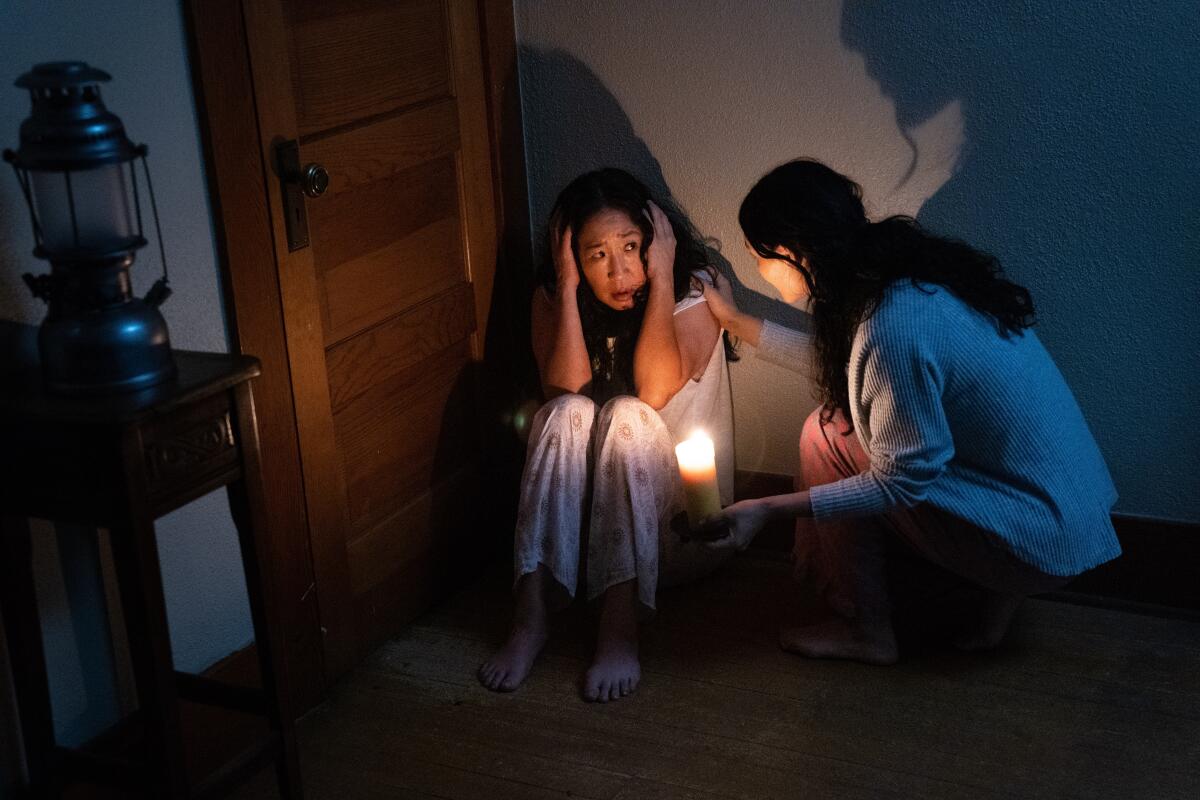Review: ‘Umma’ explores our nightmare of turning into our mothers

Mother-daughter relationships can be complicated. And depending on the shades of that complication, the thought of turning into your mother likely ranges from “unfortunate” to “worst nightmare ever.”
In “Umma,” writer and director Iris K. Shim unpacks a dynamic that falls into the latter category. The intergenerational supernatural thriller follows Amanda (an always fantastic Sandra Oh), a woman who lives pretty simply on a remote farm beekeeping with her home-schooled teenage daughter Chris (Fivel Stewart).
For your safety
The Times is committed to reviewing theatrical film releases during the COVID-19 pandemic. Because moviegoing carries risks during this time, we remind readers to follow health and safety guidelines as outlined by the CDC and local health officials.
Their seemingly peaceful life is shaken up when Amanda’s uncle arrives from Korea to deliver the remains of her estranged mother — her umma. And as if the unwelcome parcel wasn’t enough, the uncle adds in terse judgement on how Amanda has chosen to live her life and raise her daughter. Chris, on the other hand, is surprised to learn that her mother has kept so much of her past a secret.
Amanda, already emotionally haunted by the memories of her umma, then starts experiencing a supernatural haunting as well. And it becomes easier to see that although Amanda’s relationships with her umma and Chris are different, they are both flawed in their own ways.
The mother-daughter tensions within a Chinese Canadian family fuel “Turning Red,” a charming feature debut from “Bao” director Domee Shi.
The film’s PG-13 rating means the visual horror is never too gruesome, with much of the scares taking advantage of the atmospheric tension made possible by Amanda’s visceral fear of electricity. Think more classic Gothic horror than ghastly over-the-top occult. But that’s plenty to keep viewers such as me, who frighten easily, on edge as the story progresses.
What’s more poignant is the exploration of how trauma dealt and experienced by two generations of mothers are interrelated. “Umma” is not the only film released this month addressing complex mother-daughter relationships within the Asian diaspora starring Oh (see: “Turning Red”), but by centering the story on Amanda, Shim incisively highlights the connection between how a person is mothered and how she mothers through a Korean American lens.
“Umma” shows that horror remains an effective space to engage with heftier topics. While cultural specifics may differ, the weight of parental expectations that instill a sense of duty and generate guilt is familiar, particularly for children of immigrants. Painting parents as supernatural monsters is one way to address how monstrous and lasting that can be.
What I appreciate most with “Umma” is that understanding and forgiveness are not idealized. Amanda can recognize the hardships her umma experienced both as an immigrant as well as a woman bound by specific cultural expectations. But knowing there is a reason for the pain her umma caused does not excuse or negate that pain and its consequences.
'Umma'
Rated: PG-13, for terror, brief strong language and some thematic elements
Running time: 1 hour, 23 minutes
Playing: Starts March `18 in general release
More to Read
Only good movies
Get the Indie Focus newsletter, Mark Olsen's weekly guide to the world of cinema.
You may occasionally receive promotional content from the Los Angeles Times.












